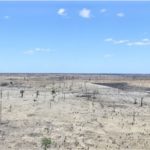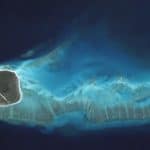Deforestation and slash and burn in Madagascar
Slash and burn and charcoal bring huge soil erosion problems and biodiversity losses.

The traditional agricultural system, the collection of charcoal and the trade in precious woods are being questioned, suffering much too late.
While the number of protected areas is a sign of the will to contain the phenomenon, the lack of resources makes it difficult to impossible to contain the disaster.
Madagascar is a unique biodiversity reserve in the world.
It is home to unique flora and fauna with numerous endemic species, 245 amphibian species (out of 247), 107 bird species are endemic.
A paradise that is seriously threatened by wild deforestation.
The bushfire technique is not new in Madagascar; it has become an easy answer to the lack of arable land.

The argument "You have to survive," plead the guilty, not on the defensive.
The forest is also suitable for the production of charcoal, which is needed for cooking and has therefore become the main reason for massive deforestation.
Main source of energy for Madagascar
Over 92% of the energy consumed daily in Madagascar comes from charcoal, here more than 85% of households use charcoal, mainly for meal preparation.
This source of energy, which is financially easily accessible to all segments of the population, is by far the cheapest of all.

Families who produce charcoal in the traditional way, mainly in the countryside, earn a considerable income despite the low yield: 10 kg of wood yield only one kilogram of charcoal.
For the production of charcoal, mainly eucalyptus is used and 1 ha of eucalyptus generates a production of almost one ton or about 300 bags.
Consumption and consequences.
Cooking is done indoors, the smoke produced by the fatapera comes directly out of the house through the thatch on the roof.

Locally, this leads to deforestation of about 32,000 ha of forest.
About 70% of Antananarivo's charcoal needs are met by the pine and eucalyptus massifs of Anjozorobe, Tiazompaniry, Majakandriana, and Moramanga.
Deforestation and its consequences
For example, the mountains no longer play their role as a water reserve, they no longer retain water and the streams dry up. Down in the valley, rice farmers see the bitter damage to their crops; when the rains fail, they are almost nil.
In Madagascar, the tradition of slash and burn threatens the forest and the future of its inhabitants.
The flames that sweep through the savannah instantly engulf the vegetation and landscapes that have been abandoned by the rains for too long.
A bushfire in southern Madagascar, making the dark night visible for miles.

A daily spectacle in the great tradition of burning practiced from generation to generation on this land.
There was a time when the forest that protects the mountains also covered a large part of the valleys, but hectare after hectare the trees were cut down, the land burned and turned into charcoal.
No 10% of the original vegetation are still preserved.
Three problems intersect and together contribute to irreversible terminal deforestation: population growth, which requires both more arable land and more charcoal.
Slash and burn in Madagascar is one of the most alarming in the tropical environment.
In the south and southwest of the island, the cultivation of corn on slash-and-burn land is the main cause of forest decline, which, especially important in this region, is increasing year by year.
It seems that, contrary to what is often observed in the humid tropical zone, the deforestation process, which is the cause of a significant decline in plant biodiversity, is irreversible in this part of the Big Island.
Today, deforestation is reaching alarming proportions.
Every year, about 200,000 to 300,000 hectares of forest disappear. This process has intensified recently, especially in the south and southwest of the island.
In the south and southwest of the Big Island, the Rodund is largely due to the development of maize cultivation, known locally as "Hatsake". This "pioneer" agriculture is developing rapidly at the expense of the forest under the influence of several factors: increasing demographic pressure from the arrival of migrants, saturation of the most fertile land for intensive cultivation, and the loosening of government control over forest clearing.
Last but not least, corn, originally a food crop, has become a mainly commercial crop to meet the needs of the national market and those of Reunion Island. As a result, the cultivation of corn in the forest is steadily gaining ground, the breweries also consume huge quantities of corn.
Can the forest recover after logging is abandoned?
The results conclude that the clearing is irreversible.
In fact, abandoned crops are replaced by forested savanna, and the forest ecosystem does not recover even after 30 years of fallow.
Why is the forest not returning in southwestern Madagascar, as in most humid tropical regions?
On the one hand, land abandoned by cultivation is returned to other uses (grazing, timber and energy production) and regularly burned by bushfires.
On the other hand, the drier climatic conditions in southern Madagascar lead to slower vegetation dynamics.
Finally, the fragility and low competitiveness of endemic forest flora does not contribute to the restoration of secondary forests.
The deforestation and disappearance of biodiversity in Madagascar remains one of the most worrisome in the tropical world.
Although its ecological costs have not yet been fully evaluated, some points can already be highlighted.
The erosion of biodiversity proves to be very high, according to an estimate carried out in the Mikea forest, deforestation is accompanied by the disappearance of 75% of the original plant species.
Among them species of high economic value, used as timber or medicinal plants.
This is all the more alarming given that Madagascar's forests are home to almost all of the island's endemic species.


















 Villa Sibylle Antananarivo (Madagascar)
Villa Sibylle Antananarivo (Madagascar)

